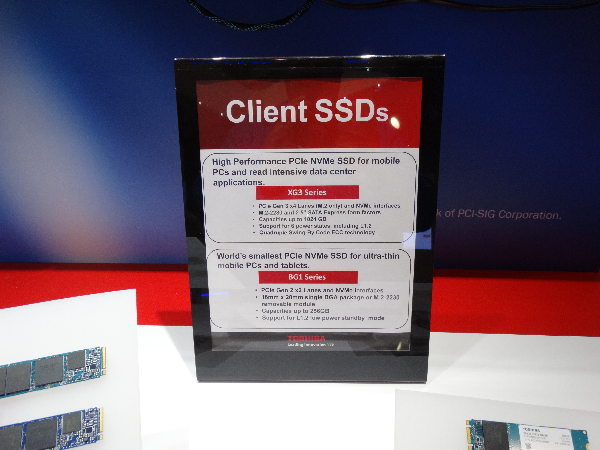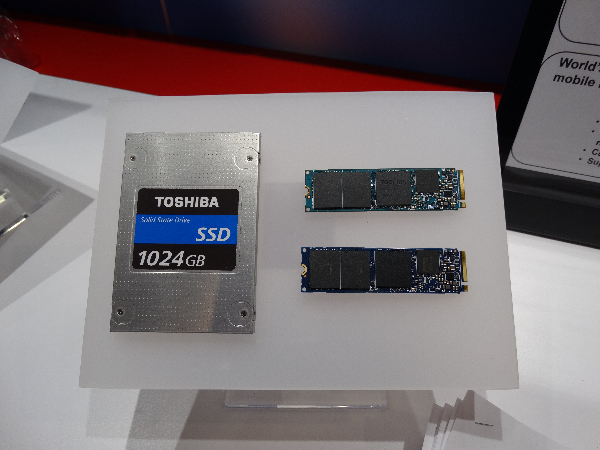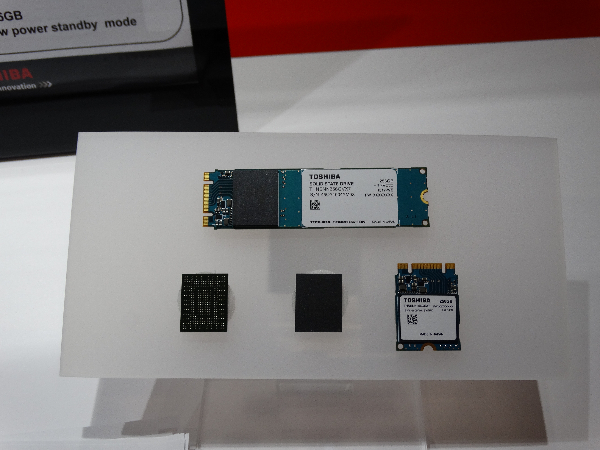Toshiba Preps Two New Client NVMe SSDs
Toshiba outed new NVMe products that could change the SSD landscape. One is high performance, the other is low cost.
In years past, Toshiba was a bit of a sleeper at trade shows and has been relativity ineffective in the retail branded market. The company's focus has always swayed towards OEM-type products, the SSDs you receive for a hefty fee in your name brand notebooks, but the OCZ Storage Solutions acquisition gave Toshiba a recognizable public face and instant credibility with end users looking to upgrade OEM SSDs and slow mechanical drives.

Toshiba's latest new products, if sold in branded notebooks today, may leave some to ask, "OCZ who?" PCIe with the NVMe protocol is all the rage from top to bottom these days on paper and at trade shows, but the market has been slow to adapt the high performance interface. Over the next few months that will change, as existing SKUs roll off and are replaced with the latest and greatest the market has to offer.
Toshiba has very limited retail exposure, even though products like the HG6 are worthy of attention. Two new products in the Toshiba client portfolio fit into the same category.

On the high performance side, the new XG3 series is everything power users want in a replacement product. Toshiba announced two flavors of XG3 at FMS 2015. The first comes in SATA Express form, a stillborn standard that we've yet to see impact the market in any way other than adding cost to nearly every new motherboard released since the Z97 chipset. SATA Express with a PCIe 2.0 x2 interface (10 Gb/s) was surpassed in both availability and performance by m.2 PCIe 3.0 x4 products that are already shipping in the market from Samsung and Marvell (HyperX Predator). At this point, SATA Express is dead in the water for many reasons, none of which we will get into here today.
The XG3 series also takes a more promising path with the m.2 standard. This XG3 has a lot of potential, with a PCIe 3.0 x4 interface (up to 32 Gb/s interface speed) and the one thing Samsung has failed to offer users: high capacity. Toshiba managed to leverage new 15nm flash in high density packages that allows up to 1 TB of capacity in a double-sided m.2 2280 form factor (up to 512 GB in a single-sided 2280). The new drive supports six power states, including L1.2, for long notebook battery life. Quadruple Swing-By Code ECC technology, currently the most advanced form for NAND flash ECC we've come across in a client SSD, was also incorporated in the design.
At Flash Memory Summit 2015 we observed the XG3 delivering over 177,000 random IOPS performance in a demo. If released today, power users would parade to their local Fry's Electronics to get a taste of consumer-grade NVMe goodness from a product that would cost considerably less than Intel's SSD 750 1.2 TB (Newegg $1,039). We mention Fry's Electronics because we routinely find Toshiba-branded SSDs gathering dust on shelves there because very few people even know of their existence.
Get Tom's Hardware's best news and in-depth reviews, straight to your inbox.

Also introduced at FMS 2015 is a PCIe 2.0 x2 single package BGA SSD that also uses the NVMe protocol, with capacities up to 256 GB. The BG1 Series can take many forms, from OEM mobile-friendly single chip BGA to m.2 2260 or m.2 2230 form factors. The low cost SSD market is about to explode with products taking aim at low cost mechanical hard disk drives sold in notebooks. NVMe allows flash to flow data faster to the CPU with less latency. When paired with L1.2 power standby mode, PCIe provides more time between trips to the power outlet in notebooks. The BG1 with a low BOM cost could potentially make it to our Best of SSDs list, fulfilling the market's dream of price parity with the lowest cost hard disk drives that currently dominate the $400 to $600 notebook space.
Chris Ramseyer is a Contributing Editor for Tom's Hardware, covering Storage. Follow him on Twitter and Facebook. Follow Tom's Hardware on Twitter, Facebook and Google+.
-
2Be_or_Not2Be "SATA Express is dead in the water for many reason" - ... and lo, everyone rejoiced!Reply
Now, if we can just get some Z170 boards that ditch the SATA Express connectors totally and give us more M.2 x 4 and/or USB 3.1 Type-A/C. Even an onboard U.2 connector would be nice. -
2Be_or_Not2Be Also, this gave me a laugh - "...the OCZ Storage Solutions acquisition gave Toshiba a recognizable public face and instant credibility with end users..."Reply
Seems to me that most of the ones who recognize the name "OCZ" would NOT give "instant credibility" to Toshiba. More like "recognizably tarnished public face" and "instant skepticism"! :) -
JPNpower ReplyAlso, this gave me a laugh - "...the OCZ Storage Solutions acquisition gave Toshiba a recognizable public face and instant credibility with end users..."
Seems to me that most of the ones who recognize the name "OCZ" would NOT give "instant credibility" to Toshiba. More like "recognizably tarnished public face" and "instant skepticism"! :)
I see it as a tradeoff with an edge towards benefit. Before buying OCZ, Toshiba was "who? IDK, let's wait until they build a proper reputation for years.", but after, they gained all of OCZ's sales channels, their OEM/Business reputation, and finally many many consumer fans who were ready to forgive OCZ given an extensive overhaul. Yeah, they alienated lots of people as well (after all, OCZ went bankrupt for a very good reason), but I think the benefits outweigh the cost. -
2Be_or_Not2Be ReplyAlso, this gave me a laugh - "...the OCZ Storage Solutions acquisition gave Toshiba a recognizable public face and instant credibility with end users..."
Seems to me that most of the ones who recognize the name "OCZ" would NOT give "instant credibility" to Toshiba. More like "recognizably tarnished public face" and "instant skepticism"! :)
I see it as a tradeoff with an edge towards benefit. Before buying OCZ, Toshiba was "who? IDK, let's wait until they build a proper reputation for years.", but after, they gained all of OCZ's sales channels, their OEM/Business reputation, and finally many many consumer fans who were ready to forgive OCZ given an extensive overhaul. Yeah, they alienated lots of people as well (after all, OCZ went bankrupt for a very good reason), but I think the benefits outweigh the cost.
Well, from the corporate side, I recognize Toshiba storage as being a storage provider for a number of OEMs. So they weren't unknown, unless you think of a retail, consumer point of view only. Even then, they had more name exposure from their laptops, so you could easily argue they have more positive mindshare than the name "OCZ." -
Eric Swenson Reply"SATA Express is dead in the water for many reason" - ... and lo, everyone rejoiced!
Now, if we can just get some Z170 boards that ditch the SATA Express connectors totally and give us more M.2 x 4 and/or USB 3.1 Type-A/C. Even an onboard U.2 connector would be nice. -
Eric Swenson Drats, no edit button! =-) 2nd try.Reply
"SATA Express is dead in the water for many reason" - ... and lo, everyone rejoiced!
Now, if we can just get some Z170 boards that ditch the SATA Express connectors totally and give us more M.2 x 4 and/or USB 3.1 Type-A/C. Even an onboard U.2 connector would be nice.
Why?? I'm totally fine with using M.2 for a small boot drive for the OS and applications, but I don't *want* a large, hot M.2 drive sitting on my motherboard, sandwiched between hot video cards.
Give me SATA Express, so I can move that hot, higher-capacity drive off the MB and put it elsewhere in my case. 2x or more of Sata3 perf is good enough for most cases right now. That's what drive sleds and cages are for. If I wanted a laptop, I'd buy one! -
JPNpower Reply16450723 said:Also, this gave me a laugh - "...the OCZ Storage Solutions acquisition gave Toshiba a recognizable public face and instant credibility with end users..."
Seems to me that most of the ones who recognize the name "OCZ" would NOT give "instant credibility" to Toshiba. More like "recognizably tarnished public face" and "instant skepticism"! :)
I see it as a tradeoff with an edge towards benefit. Before buying OCZ, Toshiba was "who? IDK, let's wait until they build a proper reputation for years.", but after, they gained all of OCZ's sales channels, their OEM/Business reputation, and finally many many consumer fans who were ready to forgive OCZ given an extensive overhaul. Yeah, they alienated lots of people as well (after all, OCZ went bankrupt for a very good reason), but I think the benefits outweigh the cost.
Well, from the corporate side, I recognize Toshiba storage as being a storage provider for a number of OEMs. So they weren't unknown, unless you think of a retail, consumer point of view only. Even then, they had more name exposure from their laptops, so you could easily argue they have more positive mindshare than the name "OCZ."
But then you ignore the mindset of the pseudo-enthusiats, who make up a big part of the market.
